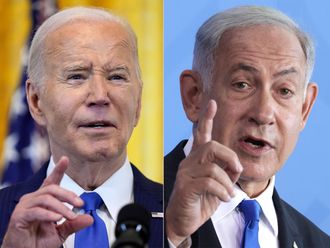Beirut: A few days after a rare outburst that took on sectarian dimensions, the vast majority of Lebanese rallied behind Prime Minister Tammam Salam, as the latter called on all parties to keep political differences away from the government he presides over. “I will not allow any attempts to obstruct the cabinet’s work,” thundered the premier, who added: “let them keep their political differences away from the government.”
By rising above the fray, Salam reiterated the need to elect a new president who will “makes us proud and who [will] represent all the Lebanese,” even if such a prospect is nowhere in sight. The prime minister probably saved the remaining honour of the country from politicians anxious to wreck it beyond repair when he rejected a poorly articulated contest that doubted his mandate. His self-designated foes, led by the Free Patriotic Movement (FPM)’s General Michel Aoun and, especially the latter’s son-in-law, Minister of Foreign Affairs Gibran Bassil, planned and carried out a carefully orchestrated outburst at last Thursday’s regularly scheduled cabinet gathering that was quickly transformed into an unbecoming shouting match.
Frustrated that FPM theatrics failed, and in light of minor clashes between an estimated 200 FPM supporters and Lebanese Army units deployed around the Grand Serail [Government House], Bassil added insult to injury when he delivered yet another raucous press conference on Friday when he emphasised that he and his movement “will confront ‘Daeshi’ politics” that, to say the least, exposed political vileness.
In fact, the epithet was so offensive that Elias Bou Saab, the Minister of Education who also hails from the FPM, rejected the description. Salam is a “moderate figure and our differences with him are strictly political,” affirmed Bou Saab. He admonished his own team and revealed without elaborating that a second heated debate occurred between Bassil and Health Minister Wael Abou Faour during last Thursday’s cabinet meeting.
The ‘Daeshi’ term did not move the affable Salam who, when asked for his reaction, simply stated that “people can distinguish right from wrong,” even if the blatant attack was cheap by any standard and false on every imaginable score. Salam, the scion of a leading Sunni family that included several leading figures that literally helped create Lebanon, has been a strict upholder of the National Pact, the constitution and the Ta’if Agreement. He has also been a defender of Christian rights and privileges in a country that cherishes sectarianism and practiced it with a vengeance.
Whether Salam’s justified anger last week would continue to exacerbate FPM plans to champion false causes was difficult to determine although General Aoun lashed out against the first target he could find on Thursday afternoon. In a measure that was truly comical, Aoun banned MTV cameras and reporters from his residence in Rabieh as he scolded a reporter at the number one Arab network during a live news conference.
Aoun snapped at Joyce Akiki when she asked him why his political allies had not joined the FPM demonstration near the Grand Serail. Immediately following the conference, and while cameras were still broadcasting, Aoun leaned across his lectern and said angrily to Akiki, “Next time, I will ask MTV to send someone else instead of you.” Cameras caught him cursing the station as he walked out.
A few hours later, the FPM sent MTV a formal email informing the station it would be banned from Aoun’s Rabieh residence, effective immediately.
Beyond this brilliant example of frustration, the FPM failed to jolt the Cabinet as the Prime Minister capitalised on the good-will momentum that his responses to Bassil gathered. Every FPM bid to embarrass or intimidate Salam, including a bizarre spin broadcast on the OTV television station that referred to the Lebanese Army as “Salam’s soldiers” [‘Askar Salam], backfired. Even an erstwhile Aoun ally, deputy Sulaiman Franjieh, objected to the demonstrations (and insisted that the military was a red-line no one should cross), though he stood by the General asthe March 8 candidate for the presidency.
Interestingly, the Hezbollah Secretary-General Hassan Nasrallah issued a similar dictum though he reaffirmed that his party would not bring down the government that, for all practical purposes, handed Salam a clear victory.
Politicians and public figures rallied to Salam’s side in the wake of what was a sorry spectacle. Indeed, the bid to further create a wedge between Lebanon’s Christians and Sunnis — for that was precisely the goal of the Bassil outburst — failed to gain traction. To be sure, Salam’s task was complicated, as he now was faced a fresh challenge to produce a workable solution to the government’s paralysis after the Eid al-Fitr break. Few expect the statesman to seek revenge as the prime minister seems determined to serve citizens by ensuring that urgent socio-economic matters are addressed during what is likely to remain a period of prolonged presidential vacancy, notwithstanding demagogues whose illusions seldom graduate to reality.











